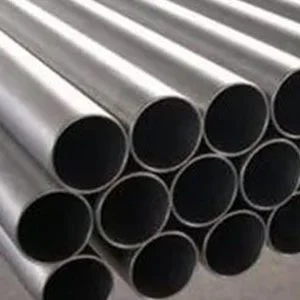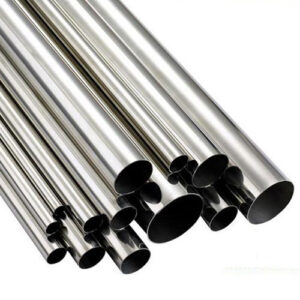Introduction

Stainless steel round tubes are essential components in numerous industries due to their exceptional durability, corrosion resistance, and aesthetic appeal. These tubes are widely utilized for their versatility and ability to withstand harsh environments, making them indispensable in applications ranging from construction to medical equipment manufacturing.
Properties of Stainless Steel Round Tubes
Stainless steel round tubes exhibit a unique set of properties that make them highly suitable for diverse applications. Here’s an in-depth look at their key properties:
Corrosion Resistance: Stainless steel round tubes are renowned for their resistance to corrosion in various environments, including acidic and chloride-rich conditions. This property is primarily attributed to the presence of chromium, which forms a protective oxide layer on the surface of the material.
Strength and Durability: With high tensile strength and excellent toughness, stainless steel round tubes offer robust performance in structural applications. They are capable of withstanding heavy loads and impacts without compromising their structural integrity.
Aesthetic Appeal: Beyond their functional benefits, stainless steel round tubes are favored for their sleek and modern appearance. They can be polished to achieve a mirror-like finish or brushed for a satin finish, enhancing their visual appeal in architectural and decorative applications.
Weldability and Formability: These tubes can be easily welded using various methods such as TIG (Tungsten Inert Gas) welding or laser welding. Their formability allows for seamless integration into complex designs, making them versatile for both aesthetic and functional purposes.
Applications in Different Industries
Stainless steel round tubes find extensive applications across a wide spectrum of industries due to their unique combination of properties:
- Construction: In the construction industry, stainless steel round tubes are used for structural supports, handrails, and architectural elements. Their corrosion resistance makes them ideal for outdoor and coastal applications where exposure to moisture and salt is common.
- Automotive: Stainless steel tubes play a critical role in automotive exhaust systems, providing durability and resistance to heat and corrosion. They are also used in structural components where strength and reliability are paramount.
- Medical: The medical industry utilizes stainless steel round tubes for surgical instruments, medical devices, and implantable components. The biocompatibility of stainless steel ensures compatibility with human tissues and fluids, making it a preferred material for critical medical applications.
- Food and Beverage: Stainless steel round tubes are essential in the food processing and beverage industries due to their hygienic properties and ease of cleaning. They are used for conveying liquids, as well as in the production of processing equipment and storage tanks where cleanliness and sanitation are crucial.
- Manufacturing: Within manufacturing sectors, stainless steel round tubes are employed in conveyor systems, machinery components, and industrial equipment. Their strength, durability, and resistance to corrosion contribute to reliable performance in challenging manufacturing environments.
Manufacturing Processes
The fabrication of stainless steel round tubes involves several precise manufacturing processes tailored to achieve desired specifications and properties:
Forming: Stainless steel tubes are typically formed through cold drawing or hot extrusion processes, which produce seamless tubes with consistent dimensions and mechanical properties.
Welding: Welding methods such as TIG welding and laser welding are employed to join stainless steel tubes. These methods ensure strong and durable welds, maintaining the integrity of the tube for various applications.
Finishing: Post-production finishing techniques such as polishing, pickling, or passivation are applied to stainless steel round tubes to enhance their surface finish and improve corrosion resistance.
Cutting and Machining: Precision cutting techniques such as sawing or laser cutting are used to cut stainless steel round tubes to specific lengths or shapes, ensuring accuracy and meeting exacting tolerances required by different industries.
Advantages of Stainless Steel Round Tubes
Stainless steel round tubes offer numerous advantages that contribute to their widespread use across industries:
- Versatility: Suitable for a wide range of applications due to their corrosion resistance and mechanical strength.
- Durability: Longevity and resistance to wear and tear, reducing maintenance costs over time.
- Hygienic Properties: Easy to clean and maintain, making them ideal for industries requiring high levels of cleanliness such as food processing and medical applications.
- Environmental Benefits: Stainless steel is fully recyclable and contributes to sustainable practices in manufacturing and construction.
Case Studies and Success Stories
Several case studies highlight the practical benefits of stainless steel round tubes in real-world applications:
- Case Study : Marine Industry: Stainless steel tubes used in offshore platforms demonstrate exceptional corrosion resistance in harsh marine environments, prolonging service life and reducing maintenance costs.
- Case Study : Food Processing: Adoption of stainless steel tubes in food processing equipment ensures hygienic handling of food products, complying with stringent sanitation standards and improving operational efficiency.
Environmental Impact and Sustainability

Stainless steel’s environmental credentials contribute to its sustainable reputation:
- Recyclability: Stainless steel is 100% recyclable without degradation in quality, making it a preferred choice for environmentally conscious industries.
- Longevity: The durable nature of stainless steel minimizes the need for replacement, reducing waste and conserving resources over the product lifecycle.
Conclusion
Stainless steel round tubes play a crucial role in modern industrial applications, offering unmatched durability, corrosion resistance, and aesthetic appeal. Their versatility allows them to meet diverse engineering challenges across sectors, from construction and automotive to medical and food processing. As industries continue to innovate, stainless steel round tubes remain at the forefront of material choices, driving advancements in technology and sustainability.
FAQ
Q: What grades of stainless steel are commonly used for round tubes?
A:Stainless steel grades such as 304 and 316 are widely used for round tubes due to their balanced combination of corrosion resistance, strength, and formability.
Q: How do you maintain stainless steel round tubes?
A:Regular cleaning with mild soap and water is recommended to remove dirt and contaminants. Avoid abrasive cleaners that could scratch the surface finish.
Q: Can stainless steel round tubes be customized for specific applications?
A:Yes, stainless steel round tubes can be customized in terms of diameter, wall thickness, and surface finish to meet specific design and performance requirements.
